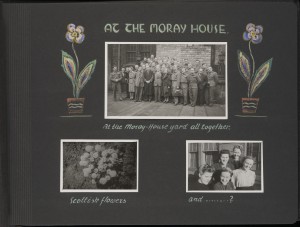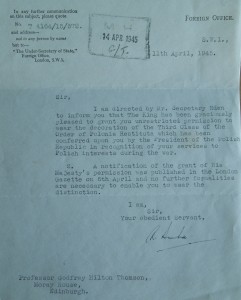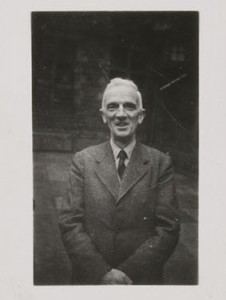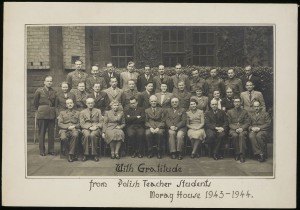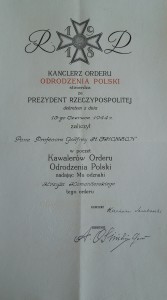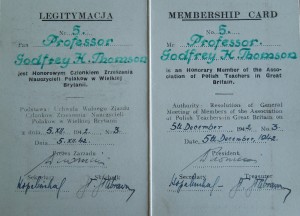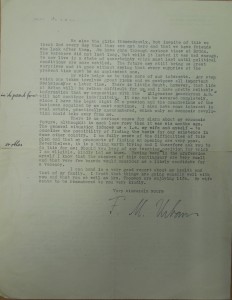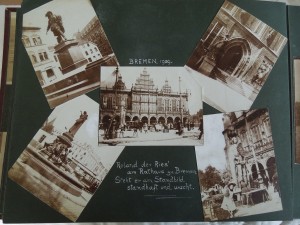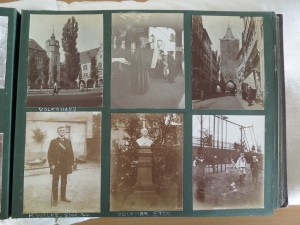Some of the most interesting letters in Thomson’s collection were sent to his widow following his death in 1955. The following, from psychiatrist and secretary of the Eugenics society Carlos Paton Blacker (1895–1975), gives a good indication of the friendship between himself and Thomson:


 It is not clear when Thomson and Blacker first became acquainted, but their research interests certainly overlapped. Thomson was the key figure in the two Scottish Mental Surveys, which tested the intelligence of almost every school child in Scotland born in 1921 and 1936 in 1932 and 1947 respectively. These were of direct interest to Blacker, who had helped establish the Royal Commission on Population.
It is not clear when Thomson and Blacker first became acquainted, but their research interests certainly overlapped. Thomson was the key figure in the two Scottish Mental Surveys, which tested the intelligence of almost every school child in Scotland born in 1921 and 1936 in 1932 and 1947 respectively. These were of direct interest to Blacker, who had helped establish the Royal Commission on Population.
The word ‘Eugenics’ is one which the 21st century audience is rather uncomfortable with. Unsurprisingly, following the holocaust and devastation of World War II, mid 20th century Britain wasn’t comfortable with the concept either. At best Eugenics was considered a mere pseudo-science (as it is to this day, despite Blacker’s efforts, widely acknowledged to be). But the eugenics of Blacker were more moderate than that of those preceding him. As Soloway argues in his Oxford DNB entry:
Under Blacker the Eugenics Society was transformed from an unfocused, amateur propaganda agency dabbling uncertainly in the newly emerging areas of birth control and genetics, into a quasi-professional research foundation committed to family planning and the serious study of population problems.
Blacker had experienced first hand the effects of a lack of access to, and information about, birth control throughout his time as a medical student at Guy’s hospital, where he encountered large numbers of deeply distressed female patients undergoing unwanted pregnancies they were powerless to avoid. However, it is undeniable that alongside this very human desire to help the women he encountered, Blacker viewed contraception as a tool to ensure what eugenicists saw as the least desirable echelons of society were not ‘out-breeding’ the more desirable.
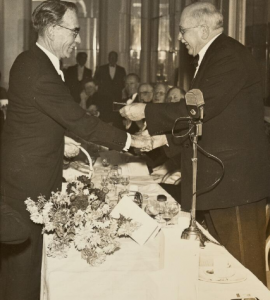
From the Wellcome Trust archives, Blacker being awarded the Galton medal, 1957 (ref: PP/CPB/B.20). Image Wellcome Trust
This was a concern that pervaded the first half of the 20th century – namely that of the perceived ‘differential birth rate’, the idea that the more educated (therefore the most desirable) sections of society were producing less offspring than the ill-educated working classes. Indeed, the second Scottish Mental Survey was undertaken in order to establish whether Scotland’s intelligence was declining (in fact, the results indicated a slight increase).
Thomson fought for a fair education for all that catered to each individual’s abilities regardless of their background, often in the face of eugenic principles which argued that such an approach would encourage the supposed ‘differential birth rate’. Similarly, Blacker faced criticism from fellow members of the Eugenics Society who believed availability of contraceptives to all would lower the birth rate of educated professionals even further. Both were men of strong beliefs, and the development of their friendship can be seen in records of the Eugenics Society held by the Wellcome Trust Library and available online.
The changes in how they address one another in the course of their correspondence are particularly telling. The surviving correspondence in the records of the Eugenics Society dates from 1946-1950 (though we know from Thomson’s papers that he and Blacker were in touch until Thomson’s death). At the onset, Thomson addresses Blacker ‘Dr Blacker’, then ‘Blacker’, then ‘My dear Blacker’. Eventually, in his letter of November 1948, Thomson begins:
(I would like to feel privileged to use the name you once told me was yours among your friends, but I can’t for the life of me remember it – Punch or Plug or something like that I think. Do tell me).
From SA/EUG/C.329, ‘Professor Sir Godfrey H Thomson’, Wellcome Trust Library
Blacker evidently signed his reply (of which only the typed copy survives) by this name, which was of course ‘Pip’. From then on, Thomson addresses Blacker as ‘Pip’, while Blacker moves from ‘My dear Thomson’ to ‘My dear Godfrey’. Their correspondence shows the value each placed on the other’s professional opinion, as well as the interest they took in one another’s lives and the enjoyment they derived from one other’s company.
When Blacker was awarded the Galton medal two years after Thomson’s death, Lady Thomson wrote to him (her letter can be found in Blacker’s personal papers, held by the Wellcome Trust Library and available online) in her typically touching fashion:
I can only say how delighted I am, and you know how proud of you Godfrey would have been.
I hope he knows about it in some way or other.
From PP/CPB/B.20, ‘Award of Galton Medal to Carlos Paton Blacker’, Wellcome Trust Library
Blacker’s career was varied, taking him from an heroic performance in World War I (where he was awarded the Military Cross), to a medical graduate (then psychologist) working in Guy’s hospital. Blacker went on to work as a psychiatrist in Maudsley Hospital, where he stayed to the end of his career, broken up only by his time as a field Doctor during World War II (where he was awarded the George Medal for gallantry), and a secondment to the Ministry of Health, where he was investigating the need for psychiatric care following World War II.
Blacker was certainly an interesting character. His views, moderate in their time, are open to criticism in ours. But then everyone is a product of the time from which they emerge. Blacker’s work, whether it be establishing the needs of soldiers during and after warfare, or working towards making contraception both available and socially acceptable, was both far reaching and forward facing, and the traces he has left behind are a fascinating glimpse of the turbulent and changeful 20th century from some of its most interesting and complex characters.
Wellcome Trust University Award Research Fellow Dr Edmund Ramsden will be speaking about Eugenics and intelligence testing in the 20th century at a seminar titled ‘Gathering Intelligence: the work of Professor Sir Godfrey Thomson’, which will be held at Edinburgh University Library on the 16th May, 9-3.30 (with an optional tour of Moray House in the afternoon). Dr Ramsden will be one of 6 speakers, each looking at Thomson’s work from a different perspective. The seminar is free to attend, however booking is required. Bursaries for travel and accommodation may be available. If you are interested in attending, please contact me at Emma.Anthony@ed.ac.uk for further information.
